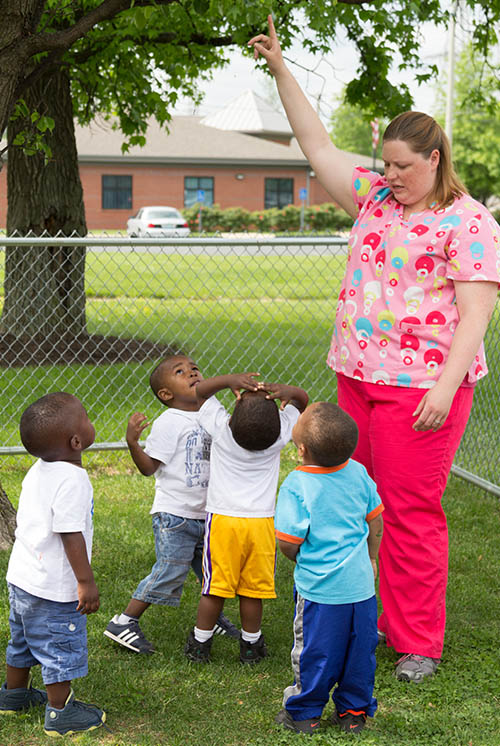Some adults are comfortable with the outdoors and interacting with nature. They are willing and eager to facilitate young children's exploration of natural elements, such as nonhazardous plants, animals, and bugs and insects; dirt and mud; rain and snow; water; and shells and stones. Some adults are less comfortable or even fearful. For example, some adults have intense, negative reactions to worms, slugs, grasshoppers, praying mantises, and ladybugs—all of which are harmless. Others do not like messy activities that involve dirt, sand, or mud. Adults who are uncomfortable or fearful may pass their discomfort and fear to young children; in turn, young children may become uncomfortable with, or even afraid of, being outside.
 All adults have a responsibility to keep infants and toddlers safe. However, some discomfort and fears are more a matter of personal taste or beliefs rather than actual risk. Program leaders can talk with staff and families about safe exploration of the natural world and provide information about which plants, animals, bugs, and insects are and are not harmless to handle.
All adults have a responsibility to keep infants and toddlers safe. However, some discomfort and fears are more a matter of personal taste or beliefs rather than actual risk. Program leaders can talk with staff and families about safe exploration of the natural world and provide information about which plants, animals, bugs, and insects are and are not harmless to handle.
To identify staff who are excited about or willing to increase their comfort with outdoor play, add questions to interviews, coaching, and supervision conversations. Such questions and prompts may include:
- Why is outdoor play important for infants and toddlers?
- How often do you think infants and toddlers should be outside? Why?
- Describe your ideal outdoor play space for infants and toddlers.
- Describe how you might plan for outdoor learning opportunities.
- What are your favorite things to do outside? With children?
- How do you feel about spending time outside or interacting with nature? If uncomfortable, what might help you become more comfortable?
- What are some challenges related to taking infants and toddlers outside? How would you deal with these challenges?
- How would you address families' opinions or preferences about outdoor play, such as taking children outdoors in the rain or engaging in messy experiences like playing with sand and water and digging in the dirt?
Reflective supervision and coaching are ways to work with staff whose discomfort or fear may interfere with or prevent children's nature explorations. Try the following strategies for addressing adult discomfort or inexperience with the outdoors:
- Invite staff to reflect on their own childhood experiences with the outdoors, as well as related cultural beliefs
- Recognize and validate anxiety or fear. Increasing comfort levels may take more than just reassurance
- Provide information about the benefits of spending time outdoors for adults (e.g., it improves physical and mental health)
- Provide opportunities for staff to "play" with water, dirt, mud, sand, stones, leaves, and other natural substances and elements
- Celebrate staff who accomplish personal goals (e.g., picking up a worm for the first time, taking appropriately dressed children outside in less comfortable weather, developing a creative use of outdoor space, or planning a creative outdoor experience)
Read more:
Resource Type: Article
National Centers: Early Childhood Development, Teaching and Learning
Last Updated: December 2, 2019